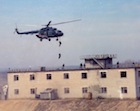 ALMATY – Before May, Kazakhstan had never experienced a suicide bombing. Since then, the country's media have reported two, as well as a related explosion in a garbage bin.
ALMATY – Before May, Kazakhstan had never experienced a suicide bombing. Since then, the country's media have reported two, as well as a related explosion in a garbage bin.
Now analysts are discussing how significant a threat suicide bombings are to Kazakhstan.
But retired National Security Committee (NSC) Col. Arat Narmandbetov warned against drawing premature conclusions. "The very first thing we need to do is neutralise all of this. We must analyse all of the components and identify its early stages."
The country's first suicide bombing took place in Aktobe May 17, when a man blew himself up in the National Security Forces building, killing himself and wounding a guard.
The second was an allegedly mistimed explosion in Atyrau October 31 that, once again, killed only the bomber. Another blast occurred at almost the same time in a nearby garbage bin. The Atyrau Oblast prosecutor's office November 7 arrested three men in connection with that area's events. The suspects are terrorists who were trying "to frighten law enforcement and other government employees," according to the prosecutor's office, news media said.
Baurzhan Kanatovich Sultangaliyev, 23, who was killed in one explosion October 31, died accidentally as he allegedly attempted a suicide bombing, the authorities said, describing him as the fourth member of the alleged terrorist group.
The man killed in the May 17 bombing was identified as Rakhimzhan Makatov, whom police described as a criminal who killed himself to avoid serving a prison sentence.
The group Jund al-Khilafah (JaK – or Soldiers of the Caliphate) took responsibility online for the October 31 Atyrau incidents and said the bombings were a warning.
"These two bombings were but a warning to the government ... if we do not see our demands (to rescind the Law on Religious Activities and Religious Associations) heard in the future, then we swear by Allah, who raised the heavens without pillars, that the next attacks will bring rivers of blood," the statement said.
The new law compels all religious organisations to re-register with the government and imposes new restrictions, including a ban on prayer in all government workplaces, including military bases. President Nursultan Nazarbayev signed it into law October 13.
The group denied that Sultangaliyev was a suicide bomber, saying the bomb apparently blew up accidentally, killing him before he could carry out his mission. The group did not identify his target.
The National Security Committee (NSC) and prosecutor's office are investigating that statement from the previously obscure JaK to determine how much truth it contains, said NSC Vice Chairman User Mizanbayev.
Ahmet Musaliyev, a mullah from Atyrau, called the group's statement a provocation and said he has not heard about an increase in extremist sentiments.
"I do not think that they are located in Kazakhstan at all, and it isn't worth talking about suicide bombers as a 'trend,'" Musaliyev said. "The last time, it wasn't proven that there was actually a suicide bombing," he said in reference to the May 17 bombing.
Suicide bombing is far from a trend in Kazakhstan, agreed Ongar Kazhi Omirbek, spokesman for the Spiritual Administration of Muslims of Kazakhstan.
"According to Islam, a person must guard his life like a gift from the Almighty," Omirbek said. "He can become a shahid, or a martyr, only during war and to protect his homeland or family, but a person cannot go to such a death just on his own accord."
Such problems would not have arisen had the country adopted the religion law earlier, Kamal Burhanov, a deputy from the lower chamber of Parliament, said.
"Yes, there are problems. No one denies this," he said. "We adopted the (religion law) too late."
Force won't solve the problem, he said.
"This is an ideology, and, naturally, the work (against it) should reflect that fact," Burhanov said. "Prison sentences aren't always necessary. We need to work with ideological methods."
Kazakhstan National University religious studies adjunct instructor Ruslan Primbetov described how one might draw a connection between the Aktobe and Atyrau bombings.
"I think that after the first suicide bombing happened, the news spread quickly and this second bomber possibly just 'borrowed' the idea," he said. "Maybe he was not happy about something or not completely mentally healthy."
As for JaK, Primbetov said the group might be seeking "glory" in claiming responsibility.
Former Interior Minister Kairbek Suleimenov asked (commentators) not to exacerbate the situation: "Kazakhstan doesn't provide the conditions needed for the active development of terrorism," he said. "But unfortunately, individual incidents are happening. ... There is no need to sow discord lest we fertilise the ground for terrorism."
Primbetov also counselled against panic.
"No one has really figured out what is going on, but the media were quick to stamp these as terrorist attacks and, what's more, as suicide bombings. If these really were suicide bombers, then there would be a lot of victims – something, thank God, that we haven't seen."




